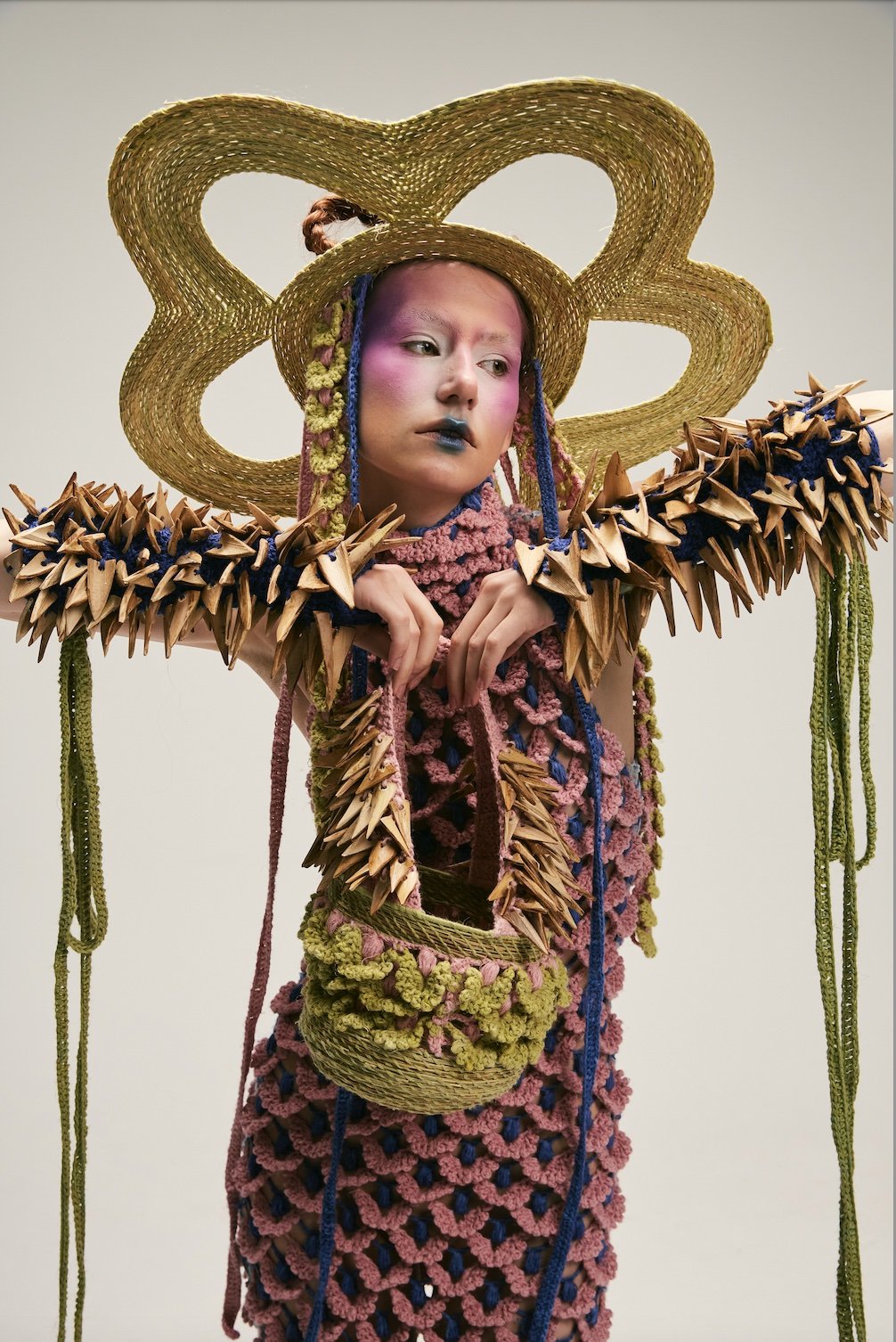Talent Talks: Silvia Acien
Growing up at a farm in rural Spain, Silvia Acien learned to closely observe her surrounding. Her collection Regenerative Folklore unites the past and the present, weaving together memories and identities passed down from her Andalusian ancestors.
Image by Yanxin Ma
Could you please introduce yourself?
My name is Silvia Acién, I am a Spanish Andalusian designer who graduated from Central Saint Martins BA Knitwear course.
I come from a rural part of Spain. Growing up at my parent’s farm influenced my way of observing my surroundings. Respecting nature is one of the most important parts of my life and I try to bring this into every piece of clothing I create, using natural and regenerative elements.
During my degree, I won the Maison/0 x LVMH Green Trial Award and the Frameworks Knitters Award and showed my work at The Future Fabric Expo, London Fashion Week and TATE MODERN. I have been featured in magazines such as The Wall Street Journal, Talking Textiles, Office, FG*K, Malvie, Hunter, Sicky, Sleek, and Aether. I also took part in several Fundraising catwalks and won the Central Saint Martins Nike project.
Image by Yanxin Ma
Having graduated recently, how do you look back on your studies?
I feel grateful for all the opportunities I had in my journey as a Knitwear Design student; there has been a lot of knowledge I have been putting together during these years that I am definitely excited to start putting into practice with my brand ACIEN.
Looking back I can now analyse and rate more the importance of collaboration to learn from others without fear of adventuring ourselves in unknown pathways. At times fear can seem big enough to paralyse our actions but once you break those barriers, knowledge multiplies.
Image by Yanxin Ma
Could you please tell us something about your graduation collection/project?
Regenerative Folklore collection unites the past and the present, weaving together the memories and identity passed down from my Andalusian ancestors.
Guided by my grandmother’s wisdom, I honour my heritage through traditional techniques she taught me and local resources that belong to my village, such as esparto and cañaberas. These materials carry the essence of my heritage, and I am dedicated to preserving them for future generations as they hold the authenticity of my genesis.
I am committed to a regenerative approach, preserving the earth's resources and promoting biodiversity. My garments are made from pineapple and nettle-certified organic yarns, fully plant-based, and hand-dyed with a blend of natural dyes sourced from bacteria and invasive plants through my collaboration with Xue Chen, BioDesigner graduated from Central Saint Martins. Water conservation is a key aspect of my collection, utilising materials and dyes that require minimal water usage compared to synthetic alternatives.
With each stitch, I am not just creating a garment, but a symbol of my connection to my ancestors, my community, and the earth. Through my collection, I aim to inspire a deeper appreciation for the natural world and the importance of preserving our heritage for future generations.
Image by Yanxin Ma
Which materials, techniques, programmes and/or applications are you mostly interested in?
I am particularly drawn to plant-based fibres that are organically certified and fully biodegradable, as they align with my commitment to regeneration. Pairing these fibres with natural dyes obtained through innovative methods motivates me to believe that change is possible, as it allows for a harmonious blend of eco-conscious materials and techniques in my creative process.
I am deeply intrigued by the concepts of regeneration and circularity, as they hold immense potential for positively impacting local biodiversity and reducing water consumption, crucial factors in building a more responsible fashion industry. By focusing on these materials, techniques, and practices, I aim to contribute to a greener and more environmentally conscious approach to fashion.
The exhibition you are a part of looks into meaning of regeneration. What does regeneration mean to you and your work?
I discovered regeneration when I was working for LVMH x MAISON/0 in a project called 'Rewinding Textiles' for which I designed and executed a collection of knitted samples. That was the beginning of an exciting journey in discovering the importance of the positive impact of regenerative practices.
Regeneration speaks about the importance not just of the fibres that designers use but the way farmers produce them, and in which conditions every supplier of the chain is treated. Regeneration is understanding that every living being on this planet has to be respected in the harmonious way they exist.
Incorporating regeneration into my pieces has changed my way of designing, researching, creating and looking at life.
Image by Yanxin Ma
How do you perceive the meaning and importance of community within the fashion field?
In the dynamic world of fashion, community plays a crucial role in shaping the industry's impact positively. I believe fashion communities empower artists to grow together and push the boundaries of traditional practices. Embracing diversity and collective creativity fosters innovation, sustainability, and social responsibility, transforming fashion into a force for positive change.
Together, we can tackle complex challenges and work towards a more inclusive and meaningful future for the industry. Through these collaborative efforts, fashion can leave a lasting impact on society, promoting not only artistic expression but also ethical and environmentally conscious approaches to design and production.
How do you view the future of fashion? And your own role therein?
In my perspective, the future of fashion is destined to prioritise the preservation of our biodiversity and the conservation of our diminishing water resources. This shift entails a need to explore alternative approaches. Currently, numerous designers are already embarking on initiatives aimed at creating this change; however, it's evident that a substantial amount of work remains ahead. Within this landscape, I perceive my role as that of a protector of our biodiversity, armed with the capacity to raise awareness about the critical significance of regenerative practices in the realm of fashion.
Image by Yanxin Ma





